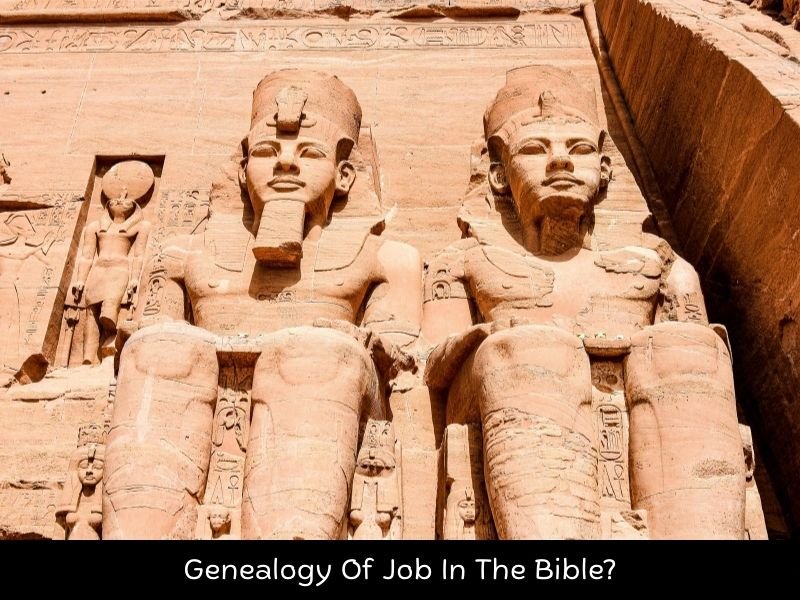Understanding the Genealogy Of Job In The Bible is an endeavor that transcends mere curiosity about ancestral lines; it invites us to delve deeply into the intricate tapestry of one of the most enigmatic and revered figures in biblical literature. Job’s lineage is not simply a record of names or familial ties; rather, it embodies a rich confluence of cultural heritage, historical significance, and profound theological meaning that together illuminate the broader narrative of faith, endurance, and divine testing. The genealogy of Job in the Bible remains a subject of considerable scholarly debate and interpretative exploration, offering diverse perspectives that connect this patriarchal figure to various historical and spiritual traditions.
By tracing the Genealogy Of Job In The Bible, we gain invaluable insights into the cultural contexts from which Job emerged, enhancing our comprehension of his character and the exceptional circumstances surrounding his life and trials. This exploration reveals not only the familial relationships that shaped Job’s identity but also the symbolic and doctrinal themes embedded within his ancestral background. From connections suggested between Job and notable lineages such as the Edomites or the Horites to considerations of his homeland in the land of Uz, the genealogical study sheds light on the multifaceted nature of Job’s heritage.
This article aims to provide a comprehensive and scholarly examination of the Genealogy Of Job In The Bible, drawing upon a wide array of biblical texts, historical records, and theological interpretations. Through this detailed analysis, readers will discover how Job’s genealogy significantly influences biblical tradition, enriches theological discourse, and invites reflection on the enduring legacy of faith amid adversity.
Who Was Job?
Before looking into the Genealogy Of Job In The Bible, it is essential to understand who Job was in the biblical narrative. Job is one of the most enigmatic and revered figures in scripture. Known primarily for his faith, patience, and endurance amidst intense suffering, Job’s story is told in the Book of Job, which is part of the Wisdom Literature in the Old Testament.
Job’s historical context is somewhat ambiguous, as the Bible does not specify the exact time he lived. Scholars suggest Job may have lived during the patriarchal era, possibly before the time of Moses, which situates him roughly around the second millennium BCE. Job is portrayed as a prosperous man who faces severe trials that test his faith and integrity.
Character-wise, Job is depicted as blameless and upright, fearing God and shunning evil (Job 1:1). This depiction is crucial because understanding Job’s genealogy helps explain the cultural and spiritual background that shaped such a righteous man.
Genealogical Insights from the Septuagint
One of the key sources for the Genealogy Of Job In The Bible comes from the Septuagint—the ancient Greek translation of the Hebrew Bible. The Septuagint provides an intriguing link by identifying Job with Jobab, a figure mentioned in the genealogical records of the Edomites.
According to the Septuagint, Jobab was the second king of Edom after the death of Job. This identification places Job within the Edomite lineage, tracing back to Zerah, one of the five generations descending from Abraham. This genealogy offers a concrete ancestral line that situates Job historically and culturally.
Biblical references that support this connection include Ezekiel 14:14, where Job is mentioned alongside Noah and Daniel as examples of righteousness, and Genesis 36:31-39, which lists the kings of Edom, including Jobab. The Genealogy Of Job in The Bible, according to these texts, connects Job to a noble lineage, emphasizing his role not just as a sufferer but as a man of status and heritage.
This genealogical perspective enhances our understanding of Job’s story, showing him as part of a significant lineage, which makes his trials and faithfulness even more profound.
Alternative Genealogical Perspectives
While the Septuagint provides a compelling view, there are alternative genealogical perspectives on the Genealogy Of Job In The Bible worth exploring. Some scholars and biblical historians propose that Job may be linked to the Horite clan through Uz the Elder, who is said to be the ancestor of the Horites.
This theory posits that Job’s homeland, the Land of Uz, is connected to the Horite lineage, suggesting a different tribal and cultural affiliation for Job. The Horites were known as cave dwellers in the region of Seir, which overlapped with Edom, indicating a possible shared heritage.
Another perspective links Job to the tribe of Issachar, one of the twelve tribes of Israel. According to this view, Job was a descendant of Issachar, son of Jacob, which would place Job within the Israelite family tree rather than of Edomite or Horite descent.
These diverse genealogical theories underline the complexity and mystery surrounding the Genealogy Of Job In The Bible. Each perspective contributes to a richer understanding of Job’s heritage, highlighting different aspects of his identity and the cultural milieu he emerged from.
The Land of Uz: Job’s Homeland
The Genealogy Of Job In The Bible is intrinsically linked to the enigmatic land of Uz, which is identified in Scripture as Job’s homeland. The precise geographical location of Uz has long been a subject of scholarly debate, with several competing theories situating it in various regions of the ancient Near East. These geographical considerations are not merely incidental; they hold significant implications for understanding Job’s cultural background and ancestral lineage.
One of the most prevalent theories places Uz in the region of Edom, located to the south of the Dead Sea. This hypothesis aligns with the Septuagint’s version of Job, which equates him with Jobab, a descendant of Esau and a king of Edom. This connection would root Job’s genealogy firmly within the Edomite tradition, suggesting a rich interweaving of genealogical and spiritual heritage. Alternatively, another school of thought locates Uz in the region of Aram, to the northeast of Israel, thereby situating Job within a broader, more cosmopolitan cultural context, possibly influenced by Aramean or Mesopotamian traditions.
The cultural and historical character of Uz, as portrayed in Scripture, reveals a land of significant wealth, ancient traditions, and moral consciousness—attributes reflected in Job’s status as a prosperous and highly esteemed man. By examining the geographical and sociocultural dimensions of Uz, we gain greater depth in our exploration of the Genealogy Of Job In The Bible, allowing us to contextualize Job’s ancestry within a specific environment that profoundly shaped his identity, worldview, and enduring legacy.
Job’s Family and Descendants
A notable and enriching dimension of the Genealogy Of Job In The Bible centers on Job’s immediate family, particularly his children, who stand as visible tokens of divine restoration and favor following his prolonged period of suffering. After enduring immense trials and losing all his earlier offspring, the Bible records that Job was blessed once more with ten children—seven sons and three daughters—following his restoration. The names of his daughters are especially highlighted: Jemimah, Keziah, and Keren-Happuch (Job 42:13–15), each bearing deep symbolic resonance and spiritual meaning.
Jemimah, meaning “daylight” or “dove,” evokes themes of peace, renewal, and radiance, signifying the new dawn of Job’s restored life. Keziah, derived from “cassia,” a fragrant and valuable spice, connotes sweetness, richness, and divine favor. Keren-Happuch, translating to “horn of eye makeup,” is associated with beauty, dignity, and adornment—qualities that were esteemed in ancient Near Eastern culture. The emphasis on their names, rather than their brothers’, suggests their exceptional status.
Remarkably, Job granted his daughters an inheritance alongside their brothers—a progressive act that broke from the patriarchal norms of the time. This underscores Job’s sense of justice, equity, and renewed spiritual vision. Job’s family and descendants serve not merely as a narrative closure but as an integral thread in the Genealogy Of Job In The Bible, symbolizing restoration, legacy, and the continuity of faith across generations.
Theological Implications of Job’s Genealogy
The Genealogy Of Job In The Bible carries profound theological implications that extend far beyond the mere enumeration of ancestral names. Job’s lineage, as preserved and interpreted through various biblical and extra-biblical sources, is not just a historical reference—it serves as a theological framework through which enduring themes of faith, righteousness, divine sovereignty, and human suffering are vividly articulated. In tracing the ancestral background of Job, we encounter a spiritual narrative that transcends tribal affiliations and national identities, pointing toward a more universal and inclusive vision of the divine relationship with humanity.
Job’s genealogy emphasizes that righteousness and unwavering faithfulness are not confined to a particular ethnic lineage or covenantal group. Rather, his story—rooted in a genealogy that may connect him to the Edomites, Horites, or other ancient Semitic peoples—demonstrates that divine favor and moral integrity can flourish among those outside traditional Israelite boundaries. This challenges narrow, exclusivist interpretations of divine election and opens up a broader understanding of how God’s justice and grace operate across different cultures and peoples.
Moreover, Job’s ancestry serves as a theological bridge, linking disparate biblical traditions and reinforcing the unity of Scripture through diversity. His genealogical ties illustrate the intricate interplay between heritage and faith, underscoring the reality that spiritual identity is both inherited and cultivated through experience. The study of the Genealogy Of Job In The Bible therefore invites deeper contemplation on the significance of one’s roots—not merely in terms of bloodline, but as a spiritual lineage shaped by trials, perseverance, and divine encounters.
Conclusion
These genealogical associations challenge readers to consider the broader cultural and geographical framework that shaped Job’s narrative.
Job’s homeland in the mysterious land of Uz—often linked to regions near Edom or Aram—further situates him within a complex tapestry of Near Eastern history, emphasizing his role as a righteous man outside the immediate covenantal lineage of Abraham. His familial structure, the devastating loss of his children, and the eventual restoration of his lineage all point to the profound theological themes of suffering, divine justice, and restoration. In this sense, the Genealogy Of Job In The Bible is not only about bloodlines but also about spiritual legacy, covenantal themes, and the universality of human struggle and redemption.
By exploring the Genealogy Of Job In The Bible, scholars and readers alike are invited to enter into deeper contemplation of the text’s theological resonance. It opens a portal to understanding ancient worldviews, the reach of divine interaction beyond Israel, and the timeless relevance of Job’s unwavering faith. Ultimately, studying Job’s genealogy encourages further reflection on the enduring questions of human suffering, divine sovereignty, and the hidden wisdom of God in the lives of His people.







